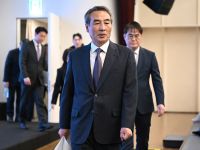Intel Science Competition for Arab students opens in Qatar

The 5th Intel Science Competition Arab World 2014 opened today (Sunday) at the Qatar National Convention Centre (QNCC) in the Qatari capital Doha.
Intel Corporation (Ltd.), the Research and Development Division of Qatar Foundation for Education, Science and Community Development (QF R&D), and Qatar’s Supreme Education Council, (SEC) have jointly organised the three-day competition aimed at Grade 9 – 12 students.
More than 100 students are participating from 9 countries across the Middle East and North Africa. Students qualified for the pan-Arab Science, Technology, Engineering and Maths (STEM) competition by winning their home country’s science competitive heats.
This week’s event, being hosted in Qatar for the first time, provides students with the opportunity to compete on an international stage.
Alongside Intel and SEC, QF R&D’s involvement in the competition stems from its core mission areas of supporting programmes in education, driving the science and research culture in Qatar and furthering learning and knowledge.
The Intel Science Competition Arab World began with an opening ceremony, with speeches from representatives of the co-organisers represented by Dr Wyatt Hume, Executive Director of Education, Training and Development at Qatar Foundation; Taha Khalifa, Intel General Manager for the MENA region, and Mr Rabea Mohammed Al Kaabi, the Undersecretary of the Ministry of Education and Higher Education in the State of Qatar.
Head Judge Dr Khalid Al Subai Scientific Director, Special Projects, at Qatar Environment & Energy Research Institute (QEERI), announced the rules of the competition and the criteria for judging. The opening ceremony ended with an inspirational talk given by keynote speaker Dr Hamad Al Ibrahim, Director of Planning and Strategic Initiatives at Qatar Foundation.
The objectives of the Intel Science Competition Arab World are to empower Arab students with skills and greater proficiency in the Science, Technology, Engineering and Maths (STEM) subjects, and to raise confidence and experience in these subjects in the Arabic language. Longer-term, the Intel Science Competition Arab World hopes to inspire students to pursue a career in science and contribute to supporting knowledge-based economies in the students’ home countries.
The students have now installed a total of 58 science projects in QNCC, and over the next three days, will be presenting their projects to Qatari and international judges.
The students’ projects are also on public display from 9am to midday on Tuesday, the last day of the competition.
The science projects are entered into six diverse categories, including: Energy and Transportation; Engineering; Mathematical and Computer Sciences; Chemistry and Biochemistry; Health Sciences; and Social Sciences. Prizes will be awarded at a closing ceremony, with a grand award for the overall winning project.
Although the Intel Science Competition Arab World is primarily a contest promoting healthy competition, it also encourages cultural exchange and social interaction. Visiting students had the opportunity to become acquainted with Qatari culture during a visit to Katara Cultural Village. Students networked during the welcome dinner and were invited to wear their national dress to proudly represent their home countries.
Dr Ayman Bassil, Head of Research Training at QF R&D, said: “Qatar Foundation is proud to co-host the Intel Science Competition Arab World, as it is more than a competition; it is a valuable educational programme encouraging continued learning and the pursuit of scientific knowledge.
“We welcome some of the brightest young scientific minds to the competition and we hope the Intel Science Competition Arab World inspires many of the students participating towards promising careers in science. Qatar Foundation plays a crucial role in contributing to human development locally, regionally, and internationally, and this competition is firmly in line with this role,” he added.
Taha Khalifa, Intel General Manager, MENA region, said: Young people in the Arab region have high potential to enable them to compete on a global level, as we have witnessed over the past few years. With sufficient training, these students will have the opportunity to contribute positively to the development of society and the growth of the economy. We look forward to a successful competition with results that can enable our students to be the next generation of innovators."
Fawziya Abdulaziz Al-Khater, Director of the Education Institute, Supreme Education Council, said: “The Science, Technology, Engineering and Maths subjects are key subjects for students in the MENA region, as they equip students with the skills needed to contribute towards an Arab future based on knowledge, innovation and scientific research.”
She added: “The Intel Science Competition Arab World is an outstanding competition as it not only encourages students to study the key science subjects at school, but to continue with these subjects at the university level and beyond.”
Background Information
Qatar Foundation
Qatar Foundation (QF) is a non-profit organization made up of more than 50 entities working in education, research, and community development.
Our unique ecosystem—supported by partnerships with leading international institutions—is built on initiatives that address our most pressing challenges, create global opportunities, and empower people to shape our present and future.







